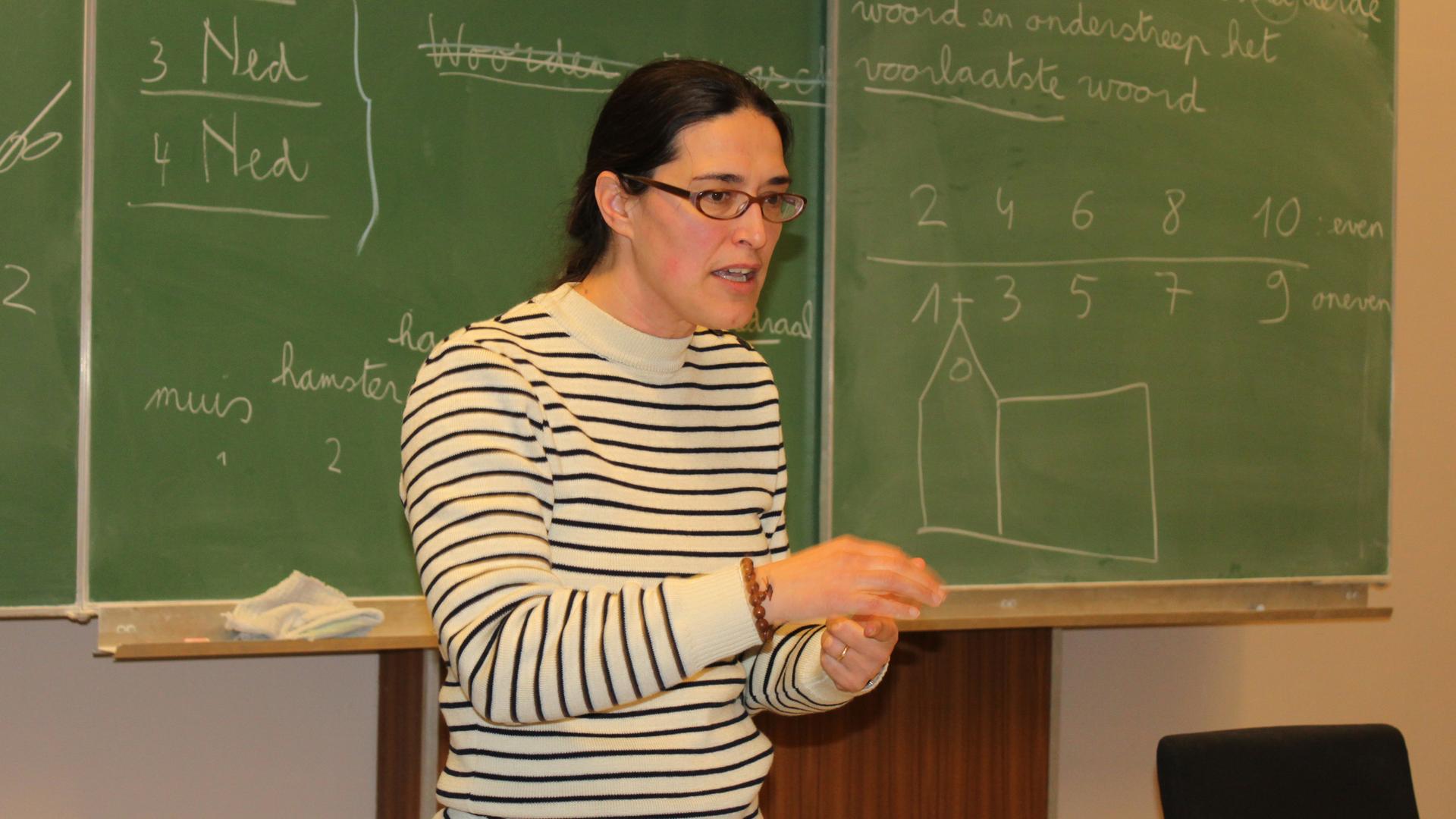What it’s like to learn a second language when you can’t read and write in your first
Maisam Hosseini and his teacher An Somers. He attends a special language program for students new to Belgium.
Imagine trying to learn a second language when you don't read and write in your first.
I heard about Maisam Hosseini when I was on a reporting trip to Brussels in November 2015. I was working on a story about local families who were taking in refugees so they didn't have to sleep on the streets. One of the people I spoke with was Catherine McSweeney. She and her husband, Thomas Vanhoutte, hosted an Afghan couple and their 13-year-old son.
Her description of the boy stuck with me. A few months later, I returned to Belgium to meet him. I witnessed the burgeoning friendship between the two families. Since then I've kept in touch with Catherine and put together a podcast for The World in Words chronicling Maisam's progress.
At the age of 13, Maisam had already acquired some impressive life skills: shepherding, escaping the Taliban, navigating the migrant trail to Western Europe. But until he arrived in Belgium he’d never opened a book or held a pen. Now he’s taking on the biggest challenge of his life: catching up with his peers in a new language in a strange land. Luckily, he's doing it with his parents by his side, and in the warm embrace of a host family committed to helping him succeed.
In Afghanistan, Maisam and his parents had a small farm with 39 sheep and a few donkeys. They lived in a place called Sanglakh in Wardak Province. When Taliban fighters started harassing Maisam while he watched over the sheep, his parents knew it was time to leave. Like so many others before them, they set out for Western Europe.
Catherine helped them secure and navigate their first asylum appointment. And the families stayed in touch after the Afghans were sent to a refugee shelter on the outskirts of Brussels.
Catherine and Thomas realized early on that Maisam had never learned to read or write back in Afghanistan. When he was placed in a school near the refugee center, they could tell he was struggling. They fought to have him moved to a school with a special language program in another city.
Maisam's challenge is different from other immigrant kids who are already literate in another language. If you're literate in your first language, it's easier to learn to read and write in a second. Maisam is learning to speak Dutch, but he's also learning how to "do" school. And he's learning to read and write for the first time in any language. As a teenager.
The teachers at his new school are rooting for him. "You need at least seven years to learn a language quite well," says Kristoff Van Genechten, director of the special program Maisam attends for immigrant and refugee students. Van Genechten says Maisam will do nothing but learn Dutch for another year. Then they will integrate him into the larger school. "It's going to be hard. Everyone comes here and wants to be a lawyer or a doctor but I never met one."

With millions of people on the move around the world, schools everywhere are increasingly confronting a range of literacy in their student populations. Scholars are beginning to study and share information on cases just like Maisam's, including members of the organization LESLLA (for Low Educated Second Language and Literacy Acquisition).
In the United States, school districts welcoming so-called English Language Learners are tackling similar challenges under the acronym SLIFE (Students with Limited or Interrupted Formal Education). And there's even a new term for teenagers like Maisam who are learning to read for the first time in a language other than their native tongue: "adolescent emergent readers."
Scholars say more research is needed, but one thing is clear — kids like this need empathy and attention in order to become successful in their new environments. That much Maisam has. What he doesn't have is much certainty about his future. His family's asylum case in Belgium is still pending. Meanwhile the European Union and Afghanistan recently made a deal to send tens of thousands of Afghans home.
If he gets to stay, Maisam says he'd love to study to be a doctor or an engineer. The literacy expert at his school, Tine De Bruyn, says having that kind of dream is essential, no matter what he ends up doing in the end.
"The importance in having a dream is really big for motivating your brain," she says. "If you ask me, can he become a doctor? Yes he can. Nothing is telling me he won't be able to. People who are more realistic will say it will be difficult and I totally agree. But I cannot say he won't. Maybe it will be more realistic for him to become happy in another dream, but having the dream is really important."
Podcast Contents
1:15 A family of shepherds.
3:10 "The other part of this story, people opening their homes to complete strangers."
7:00 What next?
8:20 Visiting the refugee center
13:30 "Why are you here?"
17:10 Maisam's new school.
20:50 "Everybody comes here and wants to be a lawyer or a doctor but I never met one."
22:40 It takes more brainwork to learn your ABCs as a teenager.
29:40 Catherine's dream for Maisam.
31:20 A game of hangman.
34:50 Please leave us a review at iTunes, or wherever you listen to podcasts. Thank you!
You can follow The World in Words stories on Facebook or subscribe to the podcast on iTunes.